|
by Dawn
Brazell
Public Relations
Everyone agrees. Monkey is a
terrible name for the toy animal,
especially one with the misfortune
of having an IV permanently
attached to his wrist.
Jennifer Redfern, senior child
life specialist with MUSC's
Children's Hospital, turns to
9-year-old Elizabeth Brown who's
here on a Scrub Club visit at
MUSC. The club is open to all
pediatric patients and their
families who are interested in a
preoperative tour.
"What should we call him then?"
Elizabeth cocks her head to the
side, ponders the monkey's face,
and declares, "Tommy."
 The first part of
the Scrub Club tour allows
patients to visit the
preoperative area. Ellis and
Elizabeth Brown check out
various items Elizabeth might
see when she comes in for her
surgery. Senior child life
specialist Jennifer Redfern,
along with Tommy the monkey,
help answer questions they have.
Watch a Scrub Club video at http://bit.ly/MUSC_Scrub_Club. The first part of
the Scrub Club tour allows
patients to visit the
preoperative area. Ellis and
Elizabeth Brown check out
various items Elizabeth might
see when she comes in for her
surgery. Senior child life
specialist Jennifer Redfern,
along with Tommy the monkey,
help answer questions they have.
Watch a Scrub Club video at http://bit.ly/MUSC_Scrub_Club.
Redfern nods. "The monkey's name
will be Tommy."
In front of Tommy is a case
stocked with lip balms in a
rainbow of colors. Redfern tells
Elizabeth to pick her favorite
flavor. Taking the winning
strawberry flavor, Redfern rubs
the balm in the mask, explaining
this will go over Elizabeth's face
when she has surgery, and it will
help it to smell better than the
plastic.
Elizabeth rubs it into the mask
and takes a sniff and smiles,
agreeing that it smells much
better now.
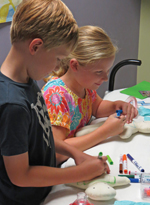 Ellis and Elizabeth
Brown color and name their
medical dolls. Right, they check
out the toy cabinet. Redfern
likes to give children an idea
of the fun activities available
while in the hospital. Ellis and Elizabeth
Brown color and name their
medical dolls. Right, they check
out the toy cabinet. Redfern
likes to give children an idea
of the fun activities available
while in the hospital.
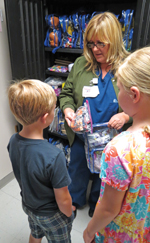
As a child life specialist,
Redfern knows this is a critical
part of preparing Elizabeth for
her procedure. "It gives a choice.
We don't get a lot of choices in
the hospital so it gives them more
control."
The two continue the discussion
of what her surgery will entail as
Elizabeth and her younger brother
Ellis get hospital fabric dolls to
decorate. Elizabeth decides she'll
take it with her on the rest of
her tour.
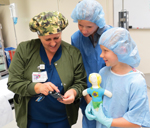 Redfern pulls up
photos on her phone of Elizabeth
and her mother, Julia Brown, in
their scrub attire. A game of I
Spy in the OR helps Elizabeth
feel more comfortable in the
room and allowed Redfern to
answer questions about the
operating room. Redfern pulls up
photos on her phone of Elizabeth
and her mother, Julia Brown, in
their scrub attire. A game of I
Spy in the OR helps Elizabeth
feel more comfortable in the
room and allowed Redfern to
answer questions about the
operating room.
Elizabeth and her mother, Julia,
suit up in scrub gear to visit the
operating room, where Redfern
answers questions about what the
various instruments and equipment
are used for, and then it's time
for surgery "I Spy." They all take
turns finding items, with anxiety
draining from Elizabeth with each
round of play.
After
seeing the operating area, Ellis
and Elizabeth Brown go to the
waiting room, where their
parents will wait during her
procedure. Redfern explains a
pain chart to Elizabeth.

Then it's time to visit the
waiting room where Julia and
family will be waiting to hear how
Elizabeth's surgery is going.
Redfern explains the procedures
board and gets popsicles for the
children. As Elizabeth eats her
treat, Redfern shows her faces
that indicate various levels of
pain. Elizabeth will be asked her
pain levels after surgery and this
will help her understand the
process before she undergoes
surgery.
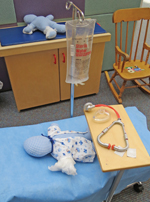 Redfern uses
medical play to help children be
more comfortable in the
hospital. Right photo: Tommy the
monkey with an IV. Redfern uses
medical play to help children be
more comfortable in the
hospital. Right photo: Tommy the
monkey with an IV. 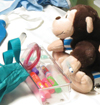
Her mother looks over the room,
adjusting that this is where
she'll have to wait for news of
her daughter's surgery. "This has
been good. It takes care of some
of the unknown," she said of the
tour.
Final stops on the tour include
going to a hospital room and
checking over the menu, where
Elizabeth picks out some of her
favorite food options, and then
going to a giant children's play
space called the Child Life
Atrium. Elizabeth and Ellis
immediately run to the air hockey
table and begin checking out other
toys.
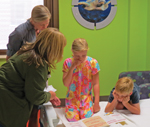 The family checks
out a hospital room and picks
out their favorite menu items. The family checks
out a hospital room and picks
out their favorite menu items.
Redfern, who has been a child
life specialist for 11 years, said
she loves her job. "There's
nothing better than making a small
difference in the life of a child.
We take care of the emotional
needs of kids. Our goal is to make
that experience a positive one."
That means offering
developmentally-appropriate
information for children and play
activities that can help them
process what's happening in their
lives. It also means figuring out
and defusing their fears. Some
parents say nothing about an
upcoming or ongoing medical
procedure, but that can magnify
fears. "Nothing is scarier than
the imagination of a child. A
child can create a very scary
story."
Redfern, who is one of 11 child
life specialists at MUSC, sees
daily how the power of preparation
and play helps children to heal.
Research shows it speeds recovery
and gives them a positive
association with the medical
center where they'll receive their
care. "One bad experience can
change forever the trust a child
has in the medical staff."
Often she sees children who are
overwhelmed by the medical
environment and the unknown. They
have so few choices and control in
their life. That's where she can
make a big impact. She gives
children choices every chance she
gets and focuses on putting the
focus back on play, even though
they have to be in the hospital.
"There's nothing better than
knowing we've made a difference in
how they see the medical staff in
general," she said. "It's really
about empowering them. It's
helping the family empower
themselves."
|



 The first part of
the Scrub Club tour allows
patients to visit the
preoperative area. Ellis and
Elizabeth Brown check out
various items Elizabeth might
see when she comes in for her
surgery. Senior child life
specialist Jennifer Redfern,
along with Tommy the monkey,
help answer questions they have.
Watch a Scrub Club video at
The first part of
the Scrub Club tour allows
patients to visit the
preoperative area. Ellis and
Elizabeth Brown check out
various items Elizabeth might
see when she comes in for her
surgery. Senior child life
specialist Jennifer Redfern,
along with Tommy the monkey,
help answer questions they have.
Watch a Scrub Club video at  Ellis and Elizabeth
Brown color and name their
medical dolls. Right, they check
out the toy cabinet. Redfern
likes to give children an idea
of the fun activities available
while in the hospital.
Ellis and Elizabeth
Brown color and name their
medical dolls. Right, they check
out the toy cabinet. Redfern
likes to give children an idea
of the fun activities available
while in the hospital.
 Redfern pulls up
photos on her phone of Elizabeth
and her mother, Julia Brown, in
their scrub attire. A game of I
Spy in the OR helps Elizabeth
feel more comfortable in the
room and allowed Redfern to
answer questions about the
operating room.
Redfern pulls up
photos on her phone of Elizabeth
and her mother, Julia Brown, in
their scrub attire. A game of I
Spy in the OR helps Elizabeth
feel more comfortable in the
room and allowed Redfern to
answer questions about the
operating room.
 Redfern uses
medical play to help children be
more comfortable in the
hospital. Right photo: Tommy the
monkey with an IV.
Redfern uses
medical play to help children be
more comfortable in the
hospital. Right photo: Tommy the
monkey with an IV. 
 The family checks
out a hospital room and picks
out their favorite menu items.
The family checks
out a hospital room and picks
out their favorite menu items.